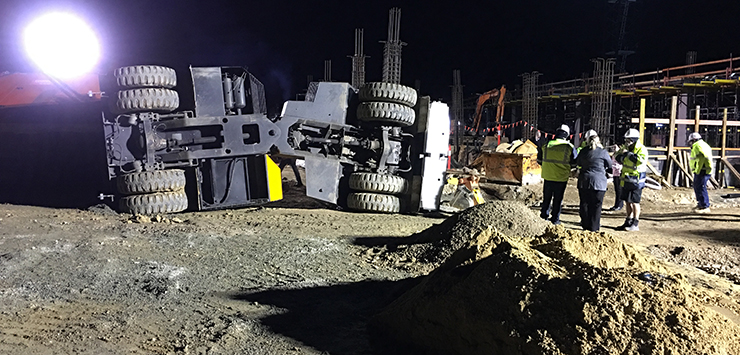
The University of Canberra Hospital worksite on the night of 4 August 2016 after a crane toppled over, killing 62-year-old Herman Holtz. Photo: ACT Policing.
A coroner has urged the review of legislation concerning coronial inquests and apologised to the family of a worker who was crushed to death by a crane for their experience of the justice system.
Herman Henrich Holtz died at the University of Canberra Hospital construction site on 4 August, 2016 when a crane carrying a generator overturned and fell on him due to its unsafe use.
Criminal charges were laid, which meant that the coronial inquest into the 62-year-old’s death couldn’t continue until they were finalised, ACT Coroner Ken Archer said in his published decision.
He said Mr Holtz’s family raised concerns about how the prosecution of these charges unfolded, saying they weren’t given enough information about the process, they couldn’t read victim impact statements during the prosecution of the worksite’s head contractor and they couldn’t understand why it took so long.
The family also felt Mr Holtz’s body was left under the crane for too long and should have been removed earlier by investigators.
“They also expressed their disappointment that the coroner’s retention of Mr Holtz’s body for a time after death, and the extent of Mr Holtz’s injuries, prevented the traditional Māori mourning ceremony (tangihanga) from taking place,” Coroner Archer said.
“The family feel that, in respect of Mr Holtz’s death, justice has not been done.”
His body had stayed under the crane for hours, and the coroner said he understood “the distress that reality has caused the family”.
“Here, and as always, a balance must be struck between the dictates of the coronial (and likely criminal) investigation, issues of safety, and the need to ensure that the body of the deceased is treated with respect and dignity. I am satisfied that occurred here,” he said.
He did note that the investigation and the criminal and coronial proceedings had taken six-and-a-half years to complete.
“Delay in the disposition of a coronial inquest can add significantly to the trauma experienced by surviving family, and on behalf of the Coroner’s Court, an apology is made to Mr Holtz’s family for the delay they have experienced and the trauma that delay has caused,” he said.
He recommended the ACT Government review the legislation that requires an inquest to be put on hold if a coroner suspects a person involved could face criminal charges.
The worksite’s head contractor Multiplex Constructions was handed a $150,000 fine in 2021, and subcontractor RAR Cranes was fined $300,000 last year over their roles in Mr Holtz’s death.
The crane’s driver, Michael John Watts, was sentenced in 2020 and has since died.
Coroner Archer said the overall safety performance of the ACT construction sector is, when compared with other jurisdictions, “quite poor” and quoted WorkSafe ACT’s 2021-2022 Annual Report, which said “the construction industry continues to miss the mark in the provision of safe and healthy working environments for its workers”.
“These general outcomes in the construction industry reflect the specific safety culture failings that were apparent in respect of Mr Holtz’s death,” he said.
“The tragic and unnecessary death of Mr Holtz was caused by the failure of an individual and identified corporate entities to comply with their statutory obligations to ensure that the workplace was safe.”
He said decisions were made to use a crane that was not suited to the task, Mr Watts was not adequately trained to use the equipment, the load was too heavy for the crane and the crane gave warnings to that fact, but those warnings were overridden.
RAR Cranes was also warned about the need to find a safer way to move the generator and Multiplex’s employees were supposed to sign documents to say the use of the crane to perform the task was safe, but they didn’t.
“The safety regime that was in place at the time, if complied with, would have meant that the accident would, in all likelihood, not have happened,” Coroner Archer said.

















